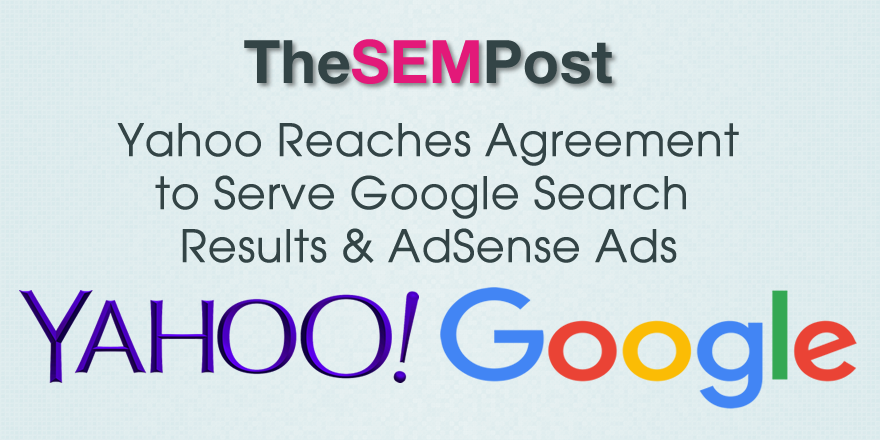 Yahoo has announced a new search partnership with Google that will see Google serve the ads and search results for Yahoo on up to 49% of search queries, replacing Bing’s own search results and ads that currently run on Yahoo.
Yahoo has announced a new search partnership with Google that will see Google serve the ads and search results for Yahoo on up to 49% of search queries, replacing Bing’s own search results and ads that currently run on Yahoo.
This doesn’t come as too big of a surprise, as it has been known that Yahoo was testing Google search results and accompanying ads. When Yahoo renegotiated their contract with Bing/Microsoft, Yahoo agreed to run 51% of their search queries through Bing with a special clause that . And this past summer, Yahoo redesigned their search results to look closer to Google’s own search results.
From the new filing:
On October 19, 2015, Yahoo! Inc., a Delaware corporation (“Yahoo”), and Google Inc., a Delaware corporation (“Google”), entered into a Google Services Agreement (the “Services Agreement”). The Services Agreement is effective as of October 1, 2015 and expires on December 31, 2018. Pursuant to the Services Agreement, Google will provide Yahoo with search advertisements through Google’s AdSense for Search service (“AFS”), web algorithmic search services through Google’s Websearch Service, and image search services. The results provided by Google for these services will be available to Yahoo for display on both desktop and mobile platforms. Yahoo may use Google’s services on Yahoo’s owned and operated properties (“Yahoo Properties”) and on certain syndication partner properties (“Affiliate Sites”) in the United States (U.S.), Canada, Hong Kong, Taiwan, Singapore, Thailand, Vietnam, Philippines, Indonesia, Malaysia, India, Middle East, Africa, Mexico, Argentina, Brazil, Colombia, Chile, Venezuela, Peru, Australia and New Zealand.
It is notable that the deal cover so many countries, as many had speculated that if Yahoo did a partnership with Google, it might only be for US traffic. The fact the UK is missing from the country list is quite interesting.
How this will impact Bing Ads advertisers remains to be seen. Because neither Yahoo nor Google released details on how Yahoo decides what search queries to serve via Google, it could be a possibility that Yahoo directs higher valued traffic to Google, as their ad values would likely be worth more revenue than the same ads served from Bing. But with many Bing Ads advertisers wanting more traffic through Bing, seeing a loss of up to 49% of the Yahoo traffic could have a noticeable impact.
This new Yahoo-Google deal is not exclusive nor does Yahoo have to send a specific amount of traffic and/or queries through Google. So this could open the door to additional testing beyond just Bing and Google too.
Under the Services Agreement, Yahoo has discretion to select which search queries to send to Google and is not obligated to send any minimum number of search queries. The Services Agreement is non-exclusive and expressly permits Yahoo to use any other search advertising services, including its own service, the services of Microsoft Corporation or other third parties.
Microsoft provided Geekwire with a statement about the new Yahoo/Google deal.
We remain committed to the Yahoo syndication partnership and will continue to serve the majority of Yahoo traffic as outlined in our contract extension. Yahoo is a valued partner and we look forward to continuing to serve our advertising customers through the Bing Ads marketplace.
But again, the “majority” can be just 51%.
Yahoo will pay Google for serving the search results, while Yahoo will get an ad revenue share through AdSense for Search, which is the syndicated version of AdSense for search results – similar to how Ask.com serves Google ads in their search results.
It will be interesting to see if Yahoo reduces their ad footprint in the search results with Google ads and results. Right now, they run 4 ads above the search results, although it seems Google does not place any restrictions on the number of their ads that can appear above the search results – Ask.com, for example, serves up to 5 ads above the search results.
This of course also leaves the door open for Yahoo to continue to develop a rumored search engine of their own.
Jennifer Slegg
Latest posts by Jennifer Slegg (see all)
- 2022 Update for Google Quality Rater Guidelines – Big YMYL Updates - August 1, 2022
- Google Quality Rater Guidelines: The Low Quality 2021 Update - October 19, 2021
- Rethinking Affiliate Sites With Google’s Product Review Update - April 23, 2021
- New Google Quality Rater Guidelines, Update Adds Emphasis on Needs Met - October 16, 2020
- Google Updates Experiment Statistics for Quality Raters - October 6, 2020